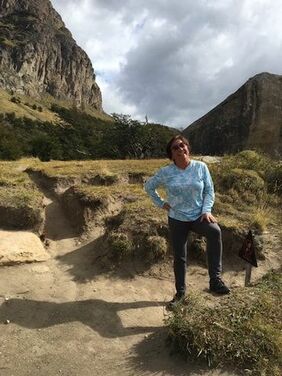Advice from a former ALS Caregiver |
|
By Dolly Sandoval
|
When Carlos emailed me that Maria had been diagnosed with ALS, it was a kick in the gut. Lots of PT scheduled… A feeding tube is scheduled for next week… Lots of follow-ups… She is listed for clinical trials…
It took me back three and a half years—to the day my husband, Ed, received the same diagnosis. I met with Maria and Carlos a few weeks ago. They were still in the “WTF is happening stage”. Maria started losing her balance six months ago. She lost her ability to speak and was getting more tired with each passing day. Their frustration lied in the realm of “we don’t know what we don’t know”—which all of us experience when given a life-changing diagnosis. |
I could not change Maria’s diagnosis, but I could offer some initial advice. Use a wheelchair to save your strength. Get balance bars in the bathrooms. Use a computer-aided voice app on your iPad. Find and attend support groups.
What I wanted to stress to my friends, though, had less to do with Maria and more to do with her husband, confidant, and best friend. I wanted to give him some advice on being a loving caretaker. I never had any formal training on being a caregiver; I just knew I had to step up my game to truly help Ed when he was diagnosed with ALS.
This is not meant to be a complete list—just some helpful starting points…
I just completed my thirtieth year of teaching. I used to think teaching was the hardest yet most rewarding job I would ever have. Now I count myself as having three of the hardest jobs ever created: teaching, being a good caregiver for my husband, and caring for myself. Over the years I’ve had varying degrees of success, laughs, and accomplishments in each of these arenas. I’ve struggled at times. Caring for Ed through his toughest time was monumentally rewarding, even in the face of adversity. I learned it is not easy caring for myself. Yet, it needed to be done.
So, remember, caregivers: we can only give the best when we are at our best, so please take care of yourself.
What I wanted to stress to my friends, though, had less to do with Maria and more to do with her husband, confidant, and best friend. I wanted to give him some advice on being a loving caretaker. I never had any formal training on being a caregiver; I just knew I had to step up my game to truly help Ed when he was diagnosed with ALS.
This is not meant to be a complete list—just some helpful starting points…
- I told Carlos that he will only be able to give his best when he is at his best, and that as much as he wanted to do for her, he needed to be mindful to also care for himself. That included healthy living, starting with being well rested.
- Being a non-sleeper myself, I literally had to train myself to sleep through the night. That didn’t seem to concern me as much when I taught high school, but once I had to be on guard for both myself and my husband, I realized I needed that deep sleep to replenish my body and mind. I employed a white-noise machine, started taking valerian root prior to bed, and lessened my liquids at night so I woke less often.
- I exercised daily. While I’ve always been physically active, I knew I’d eventually have to help Ed more. So, I focused on building muscle mass and doubled my efforts on the cardio machine. Gym time saved my sanity; it became “me” time—by me, for me. When the weather was nice, biking, walking, and golfing allowed for fresh air and a workout.
- I made a list of people who could spell me—even if I was still in the house. We’d invite friends over to watch baseball, golf tournaments, or the recorded The Late Show with Stephen Colbert. This gave us both a chance to enjoy our friends’ company, step outside our dire situation, and relax for a little while.
- I developed my own “call me anytime” friends list. And I used it. Little things became major decisions and I needed a sounding board to process new developments, adhere to new schedules, and simply talk out this debilitating disease. I often felt guilty that I wasn’t doing enough, wasn’t doing something right, hadn’t made the correct decision. This special group of friends kept me grounded and encouraged. They gave me courage.
I just completed my thirtieth year of teaching. I used to think teaching was the hardest yet most rewarding job I would ever have. Now I count myself as having three of the hardest jobs ever created: teaching, being a good caregiver for my husband, and caring for myself. Over the years I’ve had varying degrees of success, laughs, and accomplishments in each of these arenas. I’ve struggled at times. Caring for Ed through his toughest time was monumentally rewarding, even in the face of adversity. I learned it is not easy caring for myself. Yet, it needed to be done.
So, remember, caregivers: we can only give the best when we are at our best, so please take care of yourself.



